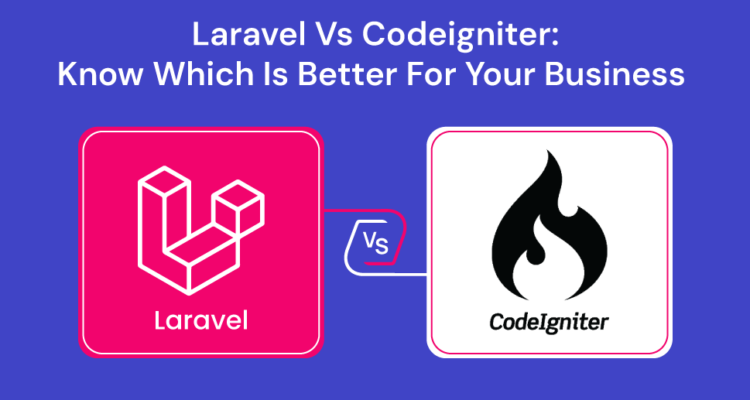
Launched in 1994, PHP has established itself as one of the popular scripting languages for building resourceful web applications. On the other hand, WordPress is a renowned CMS platform, powering 43.5% of websites available on the internet. While both are used for distinct purposes, developers utilise both platforms to build various web applications intuitively.
To help you understand the differences between these two digital assets, we have curated a blog post on PHP and WordPress. In this blog, we will explore the basics and compare these two head-to-head, as well as their pros and cons. Stay tuned!
A] Introduction to PHP
PHP (Hypertext Preprocessor) is a general-purpose scripting language that helps developers craft dynamic and resourceful websites, applications, and CRM systems. It is an open-source platform that offers excellent resources for server-side scripting, command-line scripting, and desktop application writing. Whether it is Windows, Linux, or Mac, PHP is known for offering seamless compatibility with most operating systems. With pre-written code blocks, the built-in PHP package helps developers save time and streamline their coding process.

Call Me now on +91 9033402074 or WhatsApp Me or Send Me an email to info@freelancer-coder.com to discuss your project further!
B] Introduction to WordPress
Introduced in 2003 and built on PHP, WordPress is a free and open-source content management system (CMS) that offers excellent resources to build responsive and feature-full websites. Its extensive range of plugin libraries helps developers add an array of functionalities to the websites with an install-and-play mechanism. Regardless of coding skills, WordPress provides a robust ground for building interactive websites for both experienced and new developers. Its easy-to-use interface, high customisability, and SEO-friendly features stand out.
C] WordPress vs PHP: Head-to-Head Comparison

1. Custom UX & UI
WordPress offers an array of free and paid customisation features, including plugins and themes. It helps individuals create an interacting UX and UI without any prior knowledge of coding. However, developing an extensive and industry-grade WordPress website demands an expert developer. If your goal is to create an industry-grade website on WordPress, hire a WordPress developer in India, as they offer cost-effectiveness with expertise.
PHP is a scripting language that allows developers to make changes in base code. It permits them to build feature-rich and extensive custom UX & UI designs with the help of excellent. However, PHP requires a highly expert developer with several years of experience in building PHP projects. Hiring a PHP developer in India will offer you an array of benefits, including expertise and cost-effectiveness.
Winner: WordPress for responsive UX & UI Design and PHP for extensive custom UX & UI design.
2. Performance
When comparing WordPress vs. PHP websites, WordPress offers considerable performance and speed due to its loads of plugins. However, WordPress websites can be optimised for better performance and speed by removing redundant codes from the source file.
PHP offers excellent performance due to its streamlined framework and lightweight structure. With PHP, developers can embed custom performance measures to enhance the speed of the PHP website. A facility intending to build a custom web solution can rely on the PHP framework for excellent performance.
Winner: PHP for excellent performance.
3. Cost-Effectiveness
WordPress is known for its budget-friendly solution due to its extensive resources of free and paid plugins and themes. However, premium plugins and themes have one-time or recurrent payment models for users. Consequently, they exceed budget constraints and eventually cost more in the long run.
PHP is a modern coding language. It requires expert developers to build custom and extensive web applications. Due to the requirement for expert developers, it poses a higher upfront cost. However, with PHP, you don’t have to pay for plugins and themes separately or recurrently, as they are included with the one-time development cost.
Winner: It’s a tie!
4. Security
WordPress has an array of security plugins that safeguard websites from any potential cyber-attacks or breaches. However, WordPress websites are more likely to be vulnerable as they rely on third-party plugins for website security. Therefore, it is highly essential to update your plugins and back up your data periodically to mitigate any potential data loss.
With custom security measures and sole access to its source files, PHP is renowned for developing highly secured and safe web applications. With the PHP framework, users can implement custom security measures to foolproof their web applications from cyber threats.
Winner: PHP for robust security measures.
5. Scalability
WordPress is ideal for small and medium-sized businesses, with a considerable number of scalability options. Users can scale their WordPress websites without compromising performance. However, WordPress may not be suitable for larger and more complex website architecture.
PHP is known for intuitively developing extensive and complex web projects. Whether there is high traffic growth or a requirement for feature integration, users can seamlessly scale PHP websites according to their needs. PHP is highly suitable for large, complex web applications with extended scalability options.
Winner: PHP for excellent scalability options.
6. Customisation-Friendly
With an extensive range of plugins and themes, users can customise their WordPress websites without prior coding knowledge. However, an expert developer is required if you intend to customise your WordPress website from its root level, as extensive customisation demands excellent coding skills.
PHP offers an unlimited range of customisation options for custom web applications. With root-level code changes, developers can customise every aspect of the application without any hindrance. However, to perform root-level changes, the role of a highly expert and skillful developer is paramount.
Winner: It’s a tie!
7. Seo-Friendly
WordPress has an array of plugins and other built-in features that help make your website SEO-friendly. Rank Math and Yoast SEO plugins are named for offering a variety of features and checking measures to boost your SEO score and help rank your website in search results.
When comparing PHP vs. WordPress websites, websites built on the PHP framework provide considerable SEO benefits. Developers must manually implement SEO practices to help custom web applications rank in search results. However, with an understanding of SEO and knowledge, developers can improve the PHP website’s SEO score efficiently.
Winner: WordPress for SEO-friendliness.

Call Me now on +91 9033402074 or WhatsApp Me or Send Me an email to info@freelancer-coder.com to discuss your project further!
D] PHP vs WordPress: Pros & Cons
1. WordPress: Pros & Cons

| Pros | Cons |
|---|---|
| WordPress is an open-source platform and offers accessibility to anyone. | Extensive and complex changes within WordPress websites require coding knowledge. |
| It offers easy to use interface with drag and drop facility for general customisation or change. | WordPress Doesn’t provide direct customer support to its users. They have to rely on community support. |
| WordPress has an extensive library of free and paid plugins and themes. | Sometimes, the loads of plugins hinder the website’s performance |
| With SEO-friendly plugins, users can implement best SEO practices for better search result ranking. | Most of the plugins with premium and useful features are paid. |
2. PHP: Pros & Cons

| Pros | Cons |
|---|---|
| PHP framework is platform independent and can run on a variety of operating systems. | Developing web applications with PHP requires more time to build from scratch. |
| It offers a built-in library with pre-coded blocks for seamless and streamlined coding. | It may require a developer for maintenance. |
| Secured and can be implemented custom security measures as needed. | Higher development cost due to custom coding. |
| Easily scalable for complex projects and large apps. | Requires extensive coding skills |
E] WordPress vs PHP Website: Use Case Scenario
| Use Case Scenario | WordPress | PHP |
|---|---|---|
| Business Website | Suitable for small and medium business website development. | Ideal for extensive and custom business website development. |
| E-commerce Platform | Suitable for small and medium size e-commerce platforms using WooCommerce | Ideal for extensive and large e-commerce platforms. |
| Startups or MVPs | Suitable for quick MVPs or startups needing a fast, cost-effective solution. | Best for startups requiring a fully customised and unique digital product |
| Blogging or Content Websites | Designed for blogging and content publishing. | Suitable for unique content workflows or media-heavy sites. |

Call Me now on +91 9033402074 or WhatsApp Me or Send Me an email to info@freelancer-coder.com to discuss your project further!
Conclusion
PHP and WordPress offer excellent features and tools for intuitively developing feature-rich and interactive web applications. WordPress is ideal for small and medium-sized businesses, while PHP suits large and high-volume businesses. However, despite business sizes, specific needs are equally important when selecting the right platform for building a website.
If you intend to hire a Web Developer in India, Freelance Coder is a highly experienced web developer with extensive years of experience. I offer a cost-effective solution for developing WordPress and PHP websites. Contact me today for more information.
Ashish Ajani brings over 15 years of experience in web development and design, specializing in WordPress, PHP frameworks, and responsive HTML. He has successfully built websites across industries, including eCommerce, real estate, and travel. Ashish’s proficiency in tools like Figma, Elementor, and WooCommerce, combined with a client-first approach, makes him a trusted partner for impactful online solutions.







